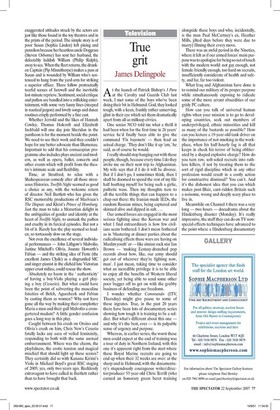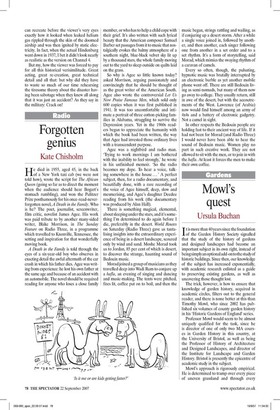True grit
James Delingpole t the launch of Patrick Bishop's 3 Para at the Cavalry and Guards Club last week, I met some of the boys who've been doing their bit in Helmand. God, they looked tough, with a keen, frankly rather unnerving, glint in their eye which set them dramatically apart from all us milksop civvies.
One senior NCO told me what a thrill it had been when for the first time in 26 years' service he'd finally been able to give the command 'Fix bayonets' — then lead an actual charge. 'They don't like it up 'em,' he said, as of course he would.
I really should stop hanging out with these people, though, because every time I do they invite me on their next trip to Afghanistan. My wife says that if I do it will be divorce. But if I don't go, I sometimes think, then I shall be doomed to spend the rest of my life half loathing myself for being such a girlie, pathetic wuss. Then my thoughts turn to all the terrible things that can happen to a chap out there: the Iranian-made IEDs, the random Russian mines, being captured and skinned alive and dipped in salt....
Our armed forces are engaged in the most serious fighting since the Korean war and what I find extraordinary is how few civilians seem bothered. I don't mean bothered as in 'blustering at dinner parties about the radicalising effects these wars are having on Muslim youth' or — like simian rock star Ian Brown — 'making Ecstasy-drenched pop records about how, like, our army should get out of wherever they're fighting now, man'. I just mean, taking time to consider what an incredible privilege it is to be able to enjoy all the benefits of Western liberal society, yet being able to send some other poor bugger off to get on with the grubby business of defending our freedoms.
I wonder whether Commando (ITV, Thursday) might give pause to some of these ingrates. True, in the past 20 years there have been lots of documentary series showing how tough it is training to be a soldier. But what's different about this one — and why it's the best, ever — is its palpable sense of urgency and purpose.
Whereas, in earlier series, the worst these men could expect at the end of training was a tour of duty in Northern Ireland, with this one it's apparent right from the start where these Royal Marine recruits are going to end up when their 32 weeks are over: at the sharp end in Helmand, with the documentary's stupendously courageous writer/director/producer 55-year-old Chris Terrill (who earned an honorary green beret training alongside these boys and who, incidentally, is the man Paul McCartney's ex, Heather Mills, jilted days before they were due to marry) filming their every move.
There was an awful period in the Nineties, where it felt as if our armed forces' main purpose was to apologise for being so out of touch with the modern world: not gay enough, not female-friendly enough, too hard on recruits, insufficiently considerate of health and safety, and far, far too violent.
What Iraq and Afghanistan have done is to remind our military of its proper purpose while simultaneously exposing to ridicule some of the more arrant absurdities of our grisly PC culture.
How can you talk of universal human rights when your mission is to go to developing countries, seek out members of underprivileged, ethnic minorities and kill as many of the bastards as possible? How can you lecture a 19-year-old tank driver on the importance of not smoking in the workplace, when his half-hourly fag is all that keeps in check his terror of being obliterated by a shaped explosive charge? How do you turn raw, soft-soled recruits into ruthless killers, if not by treating them to the sort of rigid discipline which in any other profession would result in a costly action for constructive dismissal? You can't. And it's the dishonest idea that you can which makes post-Blair, cant-ridden Britain such a noisome, wrong and deeply scary place to live in.
Meanwhile on Channel 4 there was a very long — two hours — docudrama about the Hindenburg disaster (Monday). It's really impressive, the stuff they can do on TV now: special-effects techniques have advanced to the point where a Hindenburg documentary can recreate before the viewer's very eyes exactly how it looked when leaked helium gas rippled through the skin of the doomed airship and was then ignited by static electricity. In fact, when the actual Hindenburg went down in 1937, I bet it didn't look nearly as realistic as the version on Channel 4.
But my, how the viewer was forced to pay for all this historical verisimilitude. Great acting, great re-creation, great technical detail and all that: but why did they have to waste so much of our time rehearsing the tiresome theory about the disaster having been sabotage when they knew all along that it was just an accident? As they say in the military: Crack on!


































































 Previous page
Previous page